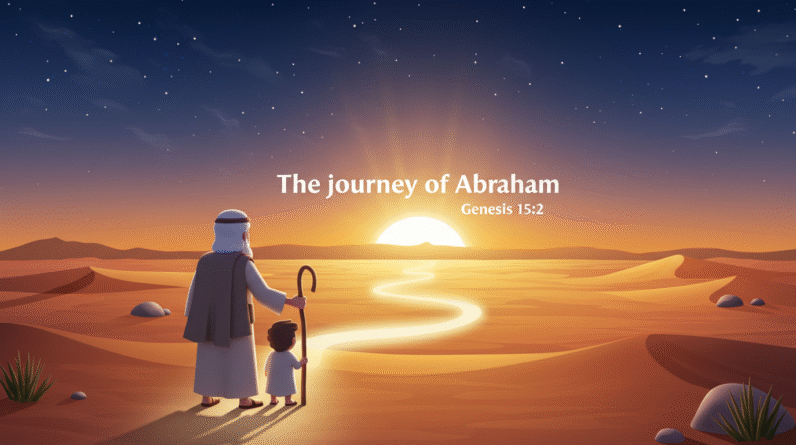Explore Abraham’s journey of faith, obedience, and divine testing in Genesis 12:1-9, 22:1-18. Discover insights into unwavering trust and its impact on generations.
Abraham: Father Of Nations – Genesis 12:1-9; Genesis 22:1-18

Introduction
Imagine being called to leave everything familiar and set off into the unknown without a clear endpoint. That’s the story of Abraham, a pivotal biblical figure whose journey we explore in Genesis 12:1-9 and Genesis 22:1-18. Often hailed as the “Father of Nations,” Abraham’s life embodies faith and obedience amidst uncertainty. He stands at the beginning of a covenantal relationship with God that impacts countless generations. Through his story, we glean insights into the enduring nature of faith, the complexities of testing, and the profound sense of trust in divine promises.
Their Story in the Bible
The Call of Abraham
In Genesis 12:1-9, Abraham is introduced during a significant divine encounter. God commands Abraham to “go from your country, your people, and your father’s household to the land I will show you.” It’s worth noting the magnitude of this call: leaving behind everything known for an uncertain future requires immense faith and courage. God promises to make Abraham into a great nation, to bless him, and to bless all peoples through him. These assurances are not merely rewards but a foundational covenant establishing Abraham’s pivotal role in God’s plans for humanity.
Abraham’s response is prompt and without apparent hesitation, marking the beginning of his journey to the land of Canaan. The passage captures the essence of faith—investing trust in the unseen and relying on divine guidance over societal or cultural security. Moral and physical challenges accompany Abraham, yet his resolve to follow divine instruction sets a benchmark for generations.
The Testing of Abraham’s Faith
Fast forward to Genesis 22:1-18, and Abraham is now the subject of the ultimate test of faith. After years of waiting, Abraham and Sarah have their promised son, Isaac. In a shockingly direct command, God instructs Abraham to sacrifice Isaac. This moment is both the climax of Abraham’s spiritual journey and a profound commentary on faith and obedience.
The narrative is rich with tension and emotional profundity—how could a loving God ask such a thing? Abraham’s trust demonstrates a faith that transcends understanding and personal cost. As the story unfolds, God intervenes, sparing Isaac and providing a ram instead. This test reinforces Abraham’s role as a father of faith, proving his unwavering trust in God’s provision and promises. His willingness to sacrifice Isaac becomes a foreshadowing of Divine sacrifice, resonating through the ages.
Lessons from Their Life
Unwavering Faith Among Uncertainty
Abraham’s story exemplifies faith beyond the tangible. When faced with divine calls to the unknown, response often wavers. Here, Abraham’s life prompts introspection about faith’s role in our journeys. Are we willing to trust when we see no path? Abraham’s legacy encourages embracing challenges as opportunities for spiritual growth and discovery.
Obedience as a Pathway to Blessing
The blessing continues through Abraham’s obedience, which becomes a conduit for divine plans. His unwavering compliance with God’s commands is not just a personal virtue but a catalyst for humanity’s broader redemption narrative. Abraham teaches us that obeying God’s challenging commands can turn pivotal in actualizing His promises.
Transformational Testing
Hardship and testing are integral to spiritual refinement, and Abraham’s narrative reinforces this difficult truth. His trials were not punishments, but rather opportunities to deepen his understanding of God’s nature and promises. Personal and spiritual transformation often follow testing, realigning our perspectives, and enhancing our resilience in the face of adversity.
Connection to Today’s World
In today’s complex world, Abraham’s story resonates strongly. It mirrors modern struggles where faith and hardship go hand in hand. Like Abraham, individuals today face calls to embrace uncertainty, leaving behind the familiar for new frontiers that promise growth but come with no guarantees. His journey invites a reevaluation of life’s priorities, focusing less on measurable outcomes and more on following a path of integrity, regardless of where it leads.
Moreover, in societies fraught with divisions, Abraham’s willingness to become a blessing to all nations challenges contemporary divisiveness and exclusion. His life serves as an encouragement to extend faith and generosity beyond cultural, ethnic, and religious boundaries, echoing a message of unity and peace.

Key Bible Verse
“Do not lay a hand on the boy,” he said. “Do not do anything to him. Now I know that you fear God, because you have not withheld from me your son, your only son” (Genesis 22:12). This verse encapsulates the crux of Abraham’s journey—the demonstration of complete trust in God leading to divine intervention. It suggests that faith’s ultimate reward might lie in the ability to relinquish control and trust fully in God’s wisdom and timing.
Thought-Provoking Question
When life presents you with tests and uncertainties, like it did for Abraham, how do you respond? Are you ready to venture into the unknown, trusting fully in a purpose beyond your understanding?
Historical and cultural insights enhance the appreciation of Abraham’s journey. The era’s social structures and religious frameworks influenced his responses, yet his story transcends its historical context to deliver timeless wisdom. Comparison with biblical figures like Job or Moses enriches this perspective of faith and testing.
In reflection, may this understanding of Abraham’s narrative inspire a faith that embraces uncertainty and a life that transforms through obedience. For those moved by his story, you’re encouraged to ponder these timeless truths and perhaps let this reflection guide your own spiritual journey.







